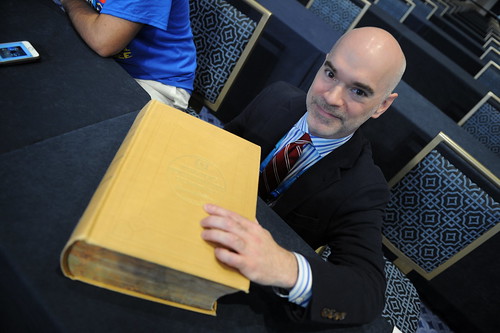"This is the biggest group of word nerds in the world," Merriam-Webster editor at large told the gathered spellers Monday night.
He probably wasn't wrong. When he asked how many people in the room read the dictionary, dozens of hands shot up.
After the opening ceremony, Sokolowski talked about the history of the dictionary, why people look up words and what they tended to look up most often online.
One of the most interesting things he found, Sokolowski said, is that people don't always look up words seeking definitions -- they look for answers to philosophical questions, like when they want to define "love," a word that often spikes mid-February. They look up words that are in the news (this year, socialism, demagogue and presumptive are among the words that have increased). And they seek words that are abstract but ubiquitous like, well, ubiquitous. Or pragmatic.
But the most-looked-up words are affect and effect. "Confusables," Sokolowski calls them.
He also said that there is some competition for how to spell words as a result of those look-ups. Now, the spelling "camaraderie" is competing with "comradery" for how that word should be spelled.
"Until dictionaries existed, spelling was fluid," he said.
And dictionaries can be influenced by society. A word that was removed from Webster's Collegiate Dictionary several years ago is again being considered.
Why might "snollygoster" make the cut? Bill O'Reilly has been using it on his show, The O'Reilly Factor, and more people are becoming familiar with it.
 "We might have to put it back in," he said.
"We might have to put it back in," he said.